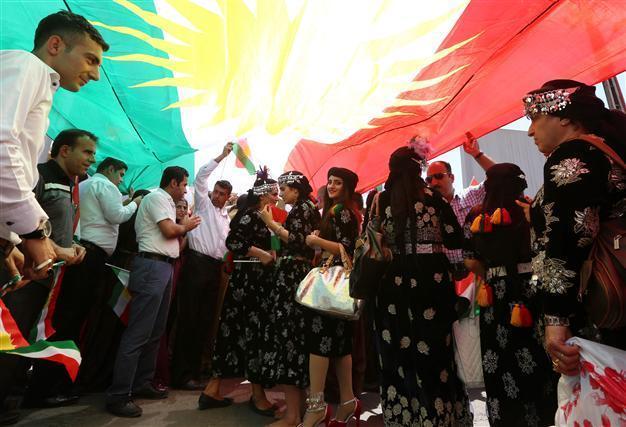Ankara ‘will not block Kurdish state in Iraq’
ANKARA

Kurdish protesters deploy a giant flag of their autonomous Kurdistan region during a demonstration to claim for its independence on July 3. AFP Photo
Iraqi Kurdish leader Barzani says Turkey is unlikely to oppose the declaration of an independent Kurdish state, while praising the bilateral ties that Arbil and Ankara have forged over the past decade.Peshmerga forces hold position on the front line in the village of Sulaiman Bek near Kirkuk. Kurdish forces have moved in to take control of Kirkuk and the surrounding territory that the regional government wants to incorporate.
“There were significant improvements. Turkish Prime Minister [Recep Tayyip] Erdoğan visited us in Arbil. This was a historic step,” Barzani told German daily Die Welt in a recent interview.
When asked if Turkey and the United States would oppose a Kurdish state, he said, “I do not expect active assistance or resistance,” Barzani told the daily.
“Not long ago, talking about the independence of Kurdistan would could have landed you in jail. Independence is the natural right of every nation,” Barzani was quoted as saying by the Kurdish media outlet Rudaw.
Turkish Deputy Prime Minister Bülent Arınç said last week Ankara would never support a disintegrated Iraq, while Hüseyin Çelik, spokesperson for the ruling Justice and Development Party (AKP), said Kurdish independence was not Turkey’s “number-one choice.”
The U.S. came out against a call by Barzani for an independence referendum, saying the country could only repel militants by staying united. Barzani told Parliament last week to make preparations for a “referendum on the right of self-determination.”
Session delayed
Meanwhile, a crucial parliamentary session kick-starting the government formation process was delayed as an Iraqi general was killed July 7. The session scheduled for today was postponed due to persistent disunity. Multiple officials and a lawmaker, all speaking on condition of anonymity, said the meeting had been rescheduled for Aug. 12 because MPs could not agree on a new speaker.
A session last week ended in chaos, with MPs trading heckles and threats before some of them eventually walked out, forcing an adjournment, with the United Nations’ special envoy warning that further delays risked plunging the country into “Syria-like chaos.”
Government efforts to repel militants were dealt a blow by the killing of a senior general. Maj. Gen. Najm Abdullah al-Sudani, the commander of the army’s 6th division, “was killed by hostile shelling in Ibrahim bin Ali,” Lt. Gen. Qassem Atta said. Ibrahim bin Ali is in the Abu Ghraib area, just west of Baghdad, near where security forces have been locked in a months-long standoff with militants who have seized control of the city of Fallujah.
Security forces have for more than a week also attempted to wrest back the Sunni stronghold and Saddam Hussein’s hometown of Tikrit from a loose alliance of Islamic State of Iraq and the Levant (ISIL) fighters, other jihadist groups and former Saddam loyalists but have so far failed to achieve a breakthrough.
















